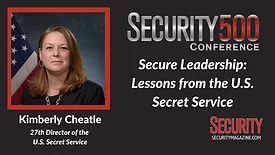Home » Keywords: » secret service
Items Tagged with 'secret service'
ARTICLES
Security Talk
Former Secret Service agents share thoughts on the shooting at the Trump campaign rally in Pennsylvania.
Read More
Security Talk
Inside The 2023 Security Benchmark Report
Security leaders can gain insights into industry trends by comparing The Security Benchmark Report data year-over-year.
November 2, 2023
Security Talk
Growing into security leadership
Reflecting on her own career progression, Erin Belknap, Managing Director, Security at Sterling Bay, shares advice for early- and mid-career professionals looking to move into a leadership role.
August 14, 2023
Security Talk
Enterprise security lessons from a secret service special agent
Jack Leskovar explains how the security management lessons learned from his 31-year career in the Secret Service benefit his private sector role in campus safety.
July 14, 2023
Sign-up to receive top management & result-driven techniques in the industry.
Join over 20,000+ industry leaders who receive our premium content.
SIGN UP TODAY!Copyright ©2026. All Rights Reserved BNP Media.
Design, CMS, Hosting & Web Development :: ePublishing










